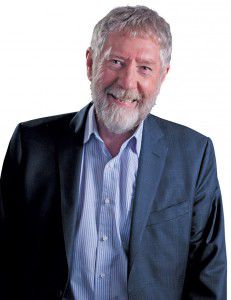PEOPLE power has challenged governments, brought down dictatorships, stopped wars and changed governments.

Michael Moore.
Ordinary people in Canberra, Sydney and Melbourne will have the chance to demand more from governments on the last weekend in November. These will be among the first cities in the world to set the stage for an international weekend of community action leading to the 2015 United Nations Climate Change Conference in Paris, the 21st meeting of the UN Conference of the Parties.
Our former prime minister was unable to meet the challenge of action on climate change. The attempts of his successors have been, at best, limited. It is time for community action!
Lining up across the world to march for action are doctors and other health workers, farmers, firefighters, emergency services volunteers, police and defence forces, people on the frontline of dealing with the impact of climate change.
They won’t be on their own. Churches, cultural groups and other NGOs will march along with older people and youth. Anyone who understands that the Paris meeting provides a catalyst for international action on climate change ought to join the march.
Australia and NZ will set the standard. The more people who march, the more decision makers around the world will feel the pressure to take real action.
Canberra has a real claim for leadership. We are one of the few jurisdictions that has shown genuine leadership on this issue.
“On the eve of the Paris talks, people from all walks of life across the Canberra region want to demonstrate that national leaders are out of step with the community,” says Phoebe Howe, spokesperson for the Conservation Council.
“Canberra is a leader in climate action, from community projects to reduce emissions to the ACT Government’s climate policies. If the world was matching our climate action we’d be on track to halt climate change.”
The march from Parliament House to Reconciliation Place from midday on Sunday, November 29, will be followed by a community festival.
The need for an international show of action comes on top of a report released recently by the World Federation of Public Health Associations (WFPHA) that examined action being taken by countries across the world.
The health impacts of climate change are one of the most significant public health risks facing the global community.
The survey found developed and developing nations lacked comprehensive national climate change action plans and policies. However, developing nations appear to be less prepared, with 70 per cent of respondent countries reporting that either their national climate policies did not address health or there was no national climate action plan.
Of those respondent countries with National Climate Change Action Plans, less than 30 per cent included analysis of projected climate change for their country, the majority (71 per cent) did not include comprehensive assessment of health impacts, and around 60 per cent had done little towards identifying vulnerable populations and infrastructure, developing public health adaptation responses, assessing coping capacity or gaps in knowledge.
Apart from the drive to reduce carbon emissions to slow climate change, action is needed to reduce the likely impacts that are the result of limited international action to date. When our leaders are slow to act, it is simply up to us.
More information at peoplesclimate.org.au/canberra
Michael Moore was an independent member of the ACT Legislative Assembly (1989 to 2001) and was minister for health. He is the vice-president and president-elect of the World Federation of Public Health Associations.
The post Moore / Why we need to wake the world’s politicians appeared first on Canberra CityNews.